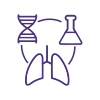Research Track
Our physician scientist training program is supported by a well-established T32 training grant and has produced internationally-recognized researchers and leaders in Pulmonary, Critical Care, and Sleep Medicine for over 40 years. Fellows receive training to ask clinically-relevant research questions, develop appropriate methods, generate and interpret primary data, and produce high-quality scientific writing. Our fellows can choose from a tremendous breadth of research possibilities with more than 120 faculty spread across four hospitals throughout the University of Washington. The Division of Pulmonary, Critical Care and Sleep Medicine is committed to providing a fourth year of funding for all research-track fellows and nearly all third- and fourth-year fellows who apply for external research funding are successful.
Research opportunities include:

Pre-Clinical Research
- Lung development, repair
and fibrosis - Microbial growth and quorum sensing
- Host responses to infection
- Lung infection, inflammation, and immune responses

Clinical Research
- Asthma
- Acute Kidney Injury (AKI)
- Acute Respiratory Distress Syndrome (ARDS)
- Bronchiolitis Obliterans Syndrome (BOS)
- Cardiac arrest
- COPD
- Cystic fibrosis
- Environmental Health
- Global Health
- Health Equity
- Health Systems
- Interstitial lung disease
- Lung cancer
- Mycobacterial infections
- Palliative Care
- Pneumonia
- Pulmonary vascular disease
- Sepsis
- Sleep disorders

Translational Research
- Biomarker discovery and analysis
- Computational biology
- Genomics
- Metabolomics
- Microbiome
- Proteomics
- Transcriptomics
Fellows begin developing their research interests and plans during “mini-sabbaticals” – two one-week long sessions during the first year of fellowship when they are relieved of clinical duties. The purpose of these sessions is to guide fellows as they define their research interests and identify mentors, and to accelerate their development and success in the program. Fellows performing clinical and translational research are supported in earning a degree (Master’s or PhD) from the prestigious University of Washington School of Public Health.
Our physician scientist training program has been highly successful. Since 2015, graduates from our program have received seventeen K08s, K23s, VA Career Development Awards; five Parker B. Francis Fellowships; three Harry Shwachman Clinical Investigator Awards; and three LeRoy Matthews Awards.
Clinician-Educator Track
In addition to training outstanding clinicians and researchers, the University of Washington is home to a premier educational community. We accept one fellow per year into our clinician-educator track, designed to create scholars in medical education.

Clinical
Up to 24 months of clinical time to build a clinical niche

Medical education training
Teaching in a variety of settings with focused feedback
Participation in the Teaching Scholars Program

Scholarship
Fellows participate in education-based scholarly activity
Clinician-educator fellows are mentored by an amazing cohort of clinical educator faculty. In addition to clinical time to develop their skills in pulmonary and critical care medicine, they have ample time for medical education training and scholarship. Our clinician educator fellows teach in small and large group sessions with medical students, residents, peers, and faculty. Most fellows complete the UW Teaching Scholars Program which is designed to train leaders in medical education. They establish an academic area of focus and produce scholarship, which may include curriculum development, education research, or the development of teaching tools. Fellows participate in monthly Clinician-Educator Workgroup meetings and present their work at the Clinician-Educator Works-in-Progress conference. Finally, clinician-educator fellows provide input on fellowship program curricular activities.
Clinical Track
We accept 1-2 fellows into our clinical track, designed to prepare individuals for careers as clinical leaders. While the first year of fellowship is identical for all fellows, clinical fellows have 8-9 months of required rotations in their second and third years of fellowship, with 3-4 months/year for electives. Electives may include research or additional clinical training opportunities, such as:
- Additional critical care rotations (e.g., Cardiothoracic ICU)
- Additional exposure to mechanical circulatory support (e.g., consult rotations for MCS or ECMO)
- Procedural blocks (e.g., echocardiography, right heart catheterization)
- Training in pertinent IM subspecialties (e.g., Palliative Care, Infectious Disease)
- Additional exposure to pulmonary subspecialties
Clinical fellows receive coaching and feedback on their teaching activities, along with formal mentoring. Clinical fellows serve on hospital committees, learn leadership skills, and participate in quality improvement research.



